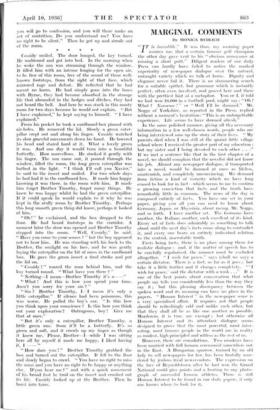MARGINAL COMMENTS
By MONICA REDLICII
‘.‘ TT is .ineredible." It was thus, my morning paper assures me, that a certain famous golf champion the other day gave vent to his "obvious annoyance at missing a short putt." Diligent readers of our daily Press can hardly have failed to notice the marked superiority of newspaper dialogue over the natural, untaught variety which we talk at home. Dignity and elegance. never fail it.. There is no stammering search for a suitable epithet, but grammar which is instantly perfect, often even involved, and graced here and there with the prettiest hint of a metaphor. You or I, if told we had won £6,000 in a football pool, might say: "Oh? What ? Nonsense ! " or " Well I'll be damned." Mr. Noggs of Yorkshire, as reported in the Press, replied without. a moment's hesitation: "This is an unforgettable experience. Life seems to have dawned afresh."
In the same polished manner, giving all th: necessary information in a few well-chosen words, people who are being interviewed sum up the story of their lives. " My parents died when I was still at the quaint little village school where I received the greater part of my education : but my sister and I being devoted to each other ." If we met ft sentence like that in the first chapter of a novel, we should complain that the novelist did not know his job. Almost any newspaper dialogue, if transported into a novel, would be damned at once as lifeless, amateurish, and completely unconvincing. We demand from fiction a kind of veracity which we have long ceased to look for in fact—which seems to me to confirm a growing conviction that facts and the truth have remarkably little in common. The news of the day is composed entirely of facts. You have one set in your paper, giving you all you can need to know about Germany, Japan, or Abyssinia, about racing, Mr. Noggs, and so forth. I have another set. The Germans have .another, the Italians another, each excellent of its kind. Every set of facts does admirably as something to talk about until the next day's facts come along to contradict, it, aml every one bears an entirely individual relation to the central, inscrutable truth.
. Facts being facts, there is no place among them for realistic dialogue ; and, if the matter of speech has to be carefully regularised, the manner must be excluded altogether. " I wish for peace," says (shall we say) a certain dictator. There is a fact, as far as it goes ; but take it a little further and it changes completely. "'I wish for peace,' said the dictator with a wink • .." It is one of the best points about conversation that what people say tells you considerably less than the way they say it ; but this pleasing discrepancy bet wern the spoken word and its meaning can have no place in the papers. " Human Interest " in the newspaper sense is a very specialised affair. It requires pot that people should be refreshingly odd and unlike each other, but that they shall all be as like one another as possible. Murderers, it is true. are exempt ; but otherwise all Human Interest and its attendant dialogue seems designed to prove that the most powerful, most inter- esting. most famous people in the world are in reality as modest, high-principled and witless as the rest of us.
However, there are consolations. Two monkeys have been married with full human ceremonial somewhere out in the East. A Hungarian sparrow, trained by an old lady to sell newspapers for her, has been brutally mur- dered by jealous rival newsvendors. The expression on the face of Reynoldstown after he had won the Grand National could give points and a beating to any photo- graph of successful human athletes. There is still Human Interest to be found in our daily papers, if only one knows where to look for it.










































 Previous page
Previous page